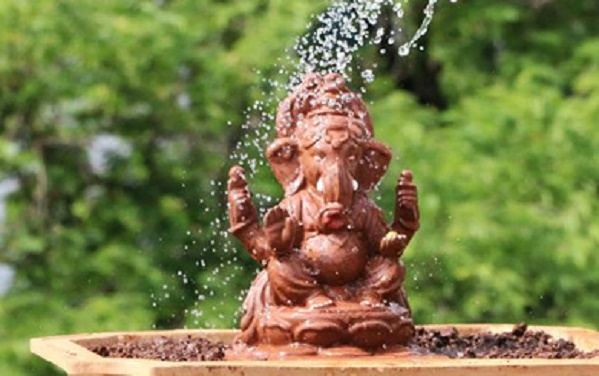Hygiene is a very important part of life as it keeps each one of us healthy both physically and mentally. Some people have a tendency to believe that modern man knows best, and that our ancestors were unaware of hygiene practices. Studying the ancient texts belies this. Manusmṛti, for example, contains detailed instructions on personal hygiene (e.g. see Manu ch 4.45-52, 77, 92, 93, 151, 153, ch 5.132-137). However, the emphasis on hygiene is not restricted to dharma texts.
While I was reading Ganeśa purāṇa, one of the upapurāṇas* I was gratified to see a set of verses where King Somakānta instructs his son on the manner of conducting oneself, including hygiene practices that one should follow.
The story goes thus: there was a great king Somakānta, who ruled the kingdom of Saurāṣṭra. He was a scholar of both Veda and Śāstra. He had all the great qualities, which a king must have. He was always surrounded by eminent scholars as his ministers. He was married to a beautiful and intelligent queen named Sudharmā. They had disciplined son named Hemakaṇṭha. He and his subjects led a very prosperous and peaceful life.
But as बृहत्कथामञ्जरी (Brhatkathamanjari) says, “अन्यद्विधत्ते पुरुषः करोति विधिरन्यथा” [Man proposes, destiny disposes]. Somakānta, though a great benevolent king, because of his previous deeds became a victim of destiny. He was severely affected by leprosy. He became very weak and was unable to dispense his duties. After consultation with his ministers and other learned paṇdits, he decided to embark on the path of Vānaprastha with his beloved wife Sudharmā.
Before leaving, Somakānta crowned his son as king of Saurāṣṭra. After the coronation ceremony and before departing for the wilderness, he advised his son, the new king, on how best to conduct himself. While instructing him, he also taught him about hygiene practices to be followed. Here are the relevant verses. They are concerned with cleanliness during and after excretion.
ततो गच्छेत् सोदपात्रो ग्रामस्य नैरृतीं दिशम् ।
मृदं गृहीत्वा सुश्वेतां ब्राह्मणः क्षत्रियोऽरुणाम् ॥१॥
वैश्यशूद्रौ तथा श्यामां न नदी तीरतः खनेत् ।
नोर्वरा या न वल्मीकात् ब्राह्मणागारतः क्वचित् ॥२॥
After getting up early in the morning and having prayed to all the deities, one should hold a vessel full of water and move towards the south-western direction. While going, the brāhmaṇa must take white soil, kṣatriya must take red soil, vaiśya and śūdra must take black soil with them (the reason behind this is not known). The soil must not be taken from the bank of river, fertile land, an ant-hill or from house of brāhmaṇa. (Verse 1-2).
तृणादिना छादयित्वा धरां मूत्रपुरीषयोः।
कृत्वोत्सर्गं दिवारात्रावुदग्दक्षिणदिङ्मुखः ॥३॥
Having excreted, one should cover the land [where one has excreted] with grass, etc. One should perform this act having faced towards North during day and facing West at night. (Verse-3).
आदौ गुदं प्रमृज्यैव तृणकाष्ठादिना नरः ।
पञ्चवारं मृदाद्भिश्च क्षालयेत्तदनन्तरम् ॥४॥
After the process of excretion, first one should clean the anus with grass or piece of wood. After that he must clean it with soil and water for five times. (Verse-4).
दशवारं वामहस्तं सप्तवारमुभौ करौ ।
लिङ्गं तथैकवारं तु वामहस्तं त्रिवारतः ॥५॥
Having excreted, one should wash the left hand ten times, both hands seven times, the penis once, and again the left palm three times. (Verse-5).
मूत्रोत्सर्गे क्षालयीत द्वौ करौ च द्विवारतः ।
पादौ सदैकवारं तु गृहस्थस्यैमीरितम् ॥६॥
व्रतवान् द्विगुणं कुर्यात् त्रिगुणं वनगोचरः ।
यतिश्चतुर्गुणं कुर्यात् रात्रावर्धं तु मौनवान् ॥७॥
After passing urine – it is said that married man should wash both palms twice and both legs once. For one, who is performing religious vows, the washing process is twice of this. One who follows the vānaprastha must perform the process three times over. An ascetic must perform four times. For the one observing the vow of silence half, of the above process. (Verse 6-7).
अर्धपादं दिवारात्रौ शौचं स्त्री शूद्र एव च ।८।
Strī and śūdra must wash the (back) half part of the leg, either it is day or night. (Verse 8).
Clearly, our ancestors were very concerned about hygiene. The process outlined is meticulous. They used to wash the hands and legs regularly to keep themselves safe from bacteria and infections caused. In ancient times, south-western part of the region was meant to such actions. Such places were away from habitation, so the inhabitants of villages and towns were not affected. The procedures may not be applicable for all times, but the underlying principle of hygiene certainly is. As an alternative to soap they used good quality soil. Today, we use hand sanitizers. Previously, ashes (rākh) were used, when soap was not available. We have a lot to learn from our ancient texts.
*(upapurāṇā means (उपमितं पुराणैः) व्यासकृताष्टादशपुराणसदृश-नाना-मुन्यादिप्रणीत-अष्टादश पुराणम् i.e. the eighteen minor or secondary purānās written by various sages which are like purānās by Vyāsa)
Bibliography:
- Ganeśa purāṇa – Dr. Ramakarana Sharma, Nag Publishers, Delhi 1998
- Sūkti sudhā – Chinmaya International Foundation, Ernakulam, 2010
- Śhabdākalpadrumā – Mobile Application by Prof Madan Mohan Jha & Shruti Jha.
With inputs from Rohini Bakshi, who runs Sanskrit Appreciation Hour on twitter
Disclaimer: The facts and opinions expressed within this article are the personal opinions of the author. IndiaFacts does not assume any responsibility or liability for the accuracy, completeness, suitability, or validity of any information in this article.
The author is an Assistant Professor of Vyakarana at the Chinmaya Vishwavidyapeeth. He earned his Ph.D from the Rashtriya Samskrit Sansthan, Sringeri under the guidance of Prof. Ramanuja Devanathan following on a traditional education under his guru Dr. Chandrashekhar Bhat, Rashtriya Samskrit Sansthan, Rajiv Gandhi Campus, Sringeri.

